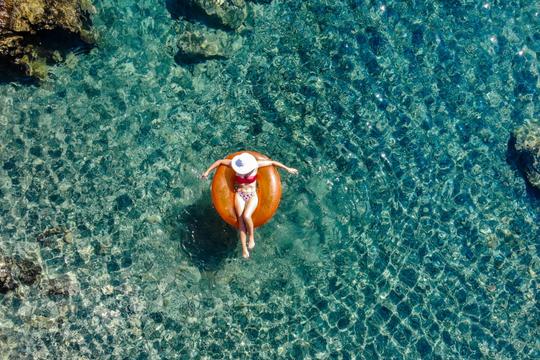
Beach please: 8 best beaches to visit in Turkey
Turkey's beaches leave travellers spoiled for choice, from the jewel-toned shores of the Mediterranean and Aegean to Black Sea hideaways
A crossroads of civilizations, Turkey spans two continents and has long been a land of contrasts. Cosmopolitan Istanbul was the capital of the Christian Byzantines for 1000 years, and its Islamic successors, the Ottomans, ruled the Mediterranean and beyond for six centuries more. The country’s blend of religion and heritage has left a trove of significant historic sites, while Turkey's Mediterranean coastline has long been famous for its beaches, nightlife and moving WWI history.
Visa requirements may change, for the most up-to-date information we recommend using our Entry Requirements tool. Alternatively, check the Turkish embassy website in your country of departure.
Recommended vaccinations include hepatitis a, hepatitis b, rabies, and tetanus.
As advice can often change, you can check out our Entry Requirements tool for the most up-to-date details on vaccination requirements.
Turkey is a large country, so the best time to visit really depends on what you’re looking to do there. June to August is hot everywhere, with temperatures reaching 28°C to 33°C (82°F to 91°F), so your best bet is probably to head to the coast during this time period. Expect plenty of crowds however.
April and May bring occasional showers but fantastic flower blooms, and September and October see warm and pleasant temperatures with occasional showers. Both of these time periods are the time to come if you’re wanting to go hiking or be active.
November to February it really cools off here and you can expect lots of rain and drizzle — central areas may even see snow.
Turkey experiences a Mediterranean climate, with hot and sunny dry summers and relatively mild winters. The hottest month of the year is July, with an average daily maximum of 35°C (95°F). The coldest month of the year tends to be January, when it can get down to around 5°C (41°F).
In terms of rainfall, January tends to have the most — expect up to 70 millimeters (2.75 inches) per month.
It is customary in Turkey to tip service providers such as waiters, at approximately 10%, depending on the service. Tipping is expected, though not compulsory, and shows an expression of satisfaction with the people helping you on your tour.
There are several times during the trip where there's an opportunity to tip the local guides or drivers we use. You may do this individually, or your CEO will offer to collect the money and tip as a group. Recommendations for tipping drivers and local guides would range from USD $15-20 per week depending on the quality of the service.
Tipping your G Adventures CEO is also very much appreciated. The amount is entirely a personal preference; however, as a guideline, USD $40-45 per person, per week is our recommendation in the region. If you felt your CEO did an especially outstanding job, any additional amount is always welcome.
The Wi-Fi in Turkey is probably not as fast as the rest of the EU, though you’ll be able to access it in pretty much every hotel, hostel, cafe, restaurant, and bar in major cities and towns. When you’re in more rural areas, expect it to be more limited.
ATMs are widely available in large cities and towns, and both Visa and Mastercard are widely accepted. We’d recommend bringing both if possible as some ATMs will only accept one variety. Check with your bank to see how much you may be charged for withdrawals — consider bringing cash in USD too.
As currency exchange rates can fluctuate often, we ask that you refer to www.xe.com for daily exchange rates.
Even though it’s legal to be gay in Turkey, it’s still not the most LGBTQ+-friendly place in the world. Much of the country outside of Istanbul is still fairly conservative, so we’d recommend using discretion and avoiding public displays of affection.
As part of their commitment, all CEOs receive LGBTQ+ inclusion training so every traveller feels respected and welcomed on all of our tours. We commit to making our tours a safe and inclusive place for people to express their authentic selves without judgment, free from any discriminatory language or harassment.
While travelling with G Adventures, all travellers must treat each other with dignity and respect to create an environment that is positive, safe, and where everyone feels welcome. You can find out more via our LGBTQ+ travel page.
Turkish is the predominant language spoken in Turkey, and 90% of the population speak it. There are around 70 other languages and dialects spoken here too — including Armenian, Greek, and Kurdish.
Officially, the tap water in Turkey is safe to drink. However, it’s often heavily chlorinated, so you may choose to drink bottled water instead.
Generally speaking, Turkey is a very safe country in which to visit — particularly within tourist areas.
However, that said, it always pays to be aware of petty crime (like pickpocketing), tourist scams, and touts — particularly in larger cities. It’s uncommon, but female travellers might also attract some unwarranted attention. Dress modestly and you should be fine.
G Adventures takes all reasonable measures to ensure your safety and enjoyment while travelling with us. All of the included activities are properly vetted and regularly checked by us, and we take great care in choosing the right transportation, stays throughout your trip, and guides to lead your tour. However, there are always inherent risks when travelling — you can find out more via our travel safety page.